




 |
   |
 |
Spirits Burning (US) see: |
 |
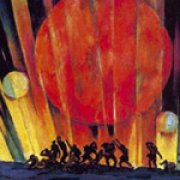 |
Vltra (2008, 54.42) ***/T |
|
| I II III VI V VI VII VIII |
IX X |
|
Current availability:
Mellotron used:
I don't think it takes too great an intellect to work out what general form of music Spite Extreme Wing play. Clue: it ain't sunshine pop. They are (or rather, were) actually an Italian black metal troupe, whose fourth and last album, Vltra (I presume that's the Roman 'V'; they didn't have a 'U'), is a surprisingly tuneful album, relatively speaking, using acoustic guitars and keyboards, although the traditional ridiculous-speed drumming and grunting 'vocals' are ever-present and correct. Track lengths vary from very brief to several near ten minutes, making this something of a black metal/prog crossover record. Black prog? There's a couple of covers here, although they're not actually listed: IV is better-known as The Misfits' Devilock, although I believe the lyrics have been changed, while X is their take on The Beatles' Helter Skelter, as revered by Charlie-boy Manson.
'Azoth' plays Mellotron, apparently a 1971 M400, if the hype's to be believed. There's also a vintage Orange amp and a Roland Space Echo on board, though rather less obviously. Given the layers of reverb (quote possibly from the space echo) under which everything's buried, it's rather hard to tell exactly where said Mellotron's to be found. V? Dunno; there's something there, but there's 'something' on several tracks. Near-definite choirs on VII and even more definite strings on VIII, plus distant choirs on X/Helter Skelter are the ones I'm highlighting, but any/all could be wrong.
Anyway, one for the metal fraternity (NEVER a sorority...) members who want something both brutal and vaguely tuneful and complex. Don't bother for the Mellotron though.
Split Enz (New Zealand) see: |
 |
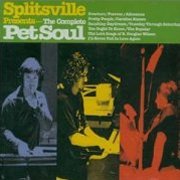 |
The Complete Pet Soul (2001, 33.21) ****/T |
|
| Overture Forever Aliceanna Pretty People Caroline Knows Sunshiny Daydream Tuesday Through Saturday You Ought to Know |
Popular Love Songs of B. Douglas Wilson I'll Never Fall in Love Again |
|
Current availability:
Mellotron used:
Splitsville began as a jokey side project from Baltimore's Greenberry Woods that took on a life of its own and outlasted its mothership. They released an EP, Pet Soul (very good, chaps...), in 1998, expanding it considerably three years later as their fourth full-length release, The Complete Pet Soul. As you might've guessed by now, it's essentially a Dukes of Stratosphear-style homage to The Beatles, The Beach Boys and anyone else they could think of who wrote great pop in the '60s and began with 'B' and, while it frequently tips over into pastiche, it's slightly less obvious than the Dukes, while at least all concerned use their real names. Not a bad track to be heard on the album, although their cover of Burt Bacharach's I'll Never Fall In Love Again, bizarrely incorporating a snatch of Buggles' Video Killed The Radio Star, is probably less than wholly essential.
Mellotron, from guitarist Matt Huseman, on (at most) two tracks, with a repeated string part actually opening the album in the brief Overture, which sort-of does what it says on the tin, with probable background strings on Popular, though I wouldn't swear to the latter. For that matter, I wouldn't swear that Overture's part is genuine, but it sounds pretty good, so I'll give it the benefit of the doubt.
If you like your pop powerful and worship at the altar of the 'B' bands, you will almost certainly love The Complete Pet Soul. Like so many other almost-forgotten musical forms (prog, AOR for Chrissakes), powerpop has moved into a ghetto all its own, where loads of obscure bands produce relatively identikit albums in their chosen style, with an absolute gem popping up every now and again. I'm not sure if this is that gem, but it's damn' good at what it does, although its Mellotron input leaves a little to be desired. Buy anyway.
Spock's Beard (US) see: |
 |
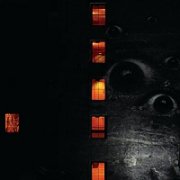 |
Spoke of Shadows (2014, 48.17) ***½/T |
|
| Dominion Images One Day Harbinger Lost One Pain Map Persona Splendid Sisters |
Tilting at Windmills Accord Dichotomy Drama of Display |
|
Current availability:
Mellotron used:
Current progressive duo Spoke of Shadows are a collaboration between drummer Bill Bachman (Neal Morse) and Warr guitarist Mark Cook Herd of Instinct, whose eponymous debut (released on Djam Karet's Firepool label) bears a sizeable stylistic debt to various eras of King Crimson, amongst others. Top tracks include scene-setting opener Dominion, the sprightly Harbinger, the highly Crimsonesque Tilting At Windmills and the doomy Dichotomy, but nothing here disappoints, in an occasionally angular, instrumental modern prog kind of way.
Djam Karet's Gayle Ellet plays Mellotron strings on Splendid Sisters, although all other 'Mellotron' use (strings and/or choirs on most tracks) is sampled. This is a fine release that should keep Djam Karet and later period Crimso fans happy; let's hope the duo stick around for long enough to record again.
See: Djam Karet
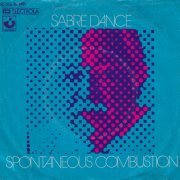 |
7" (1973) ***/T½ Sabre Dance And Now for Something Completely Different! - Sabre Dance |
Current availability:
Mellotron used:
Going by their second (and last) album, 1972's Triad (***), Spontaneous Combustion were a typical-for-the-era progressive-ish outfit (on Harvest, although to my ears they could just as easily have been on Charisma, Neon et al). A non-album single, Sabre Dance is a ripping version of the well-known Khachaturian piece, à la Dave Edmunds' Love Sculpture, backed with a slower take, strangely (and Pythonesquely) titled And Now For Something Completely Different! - Sabre Dance.
An unknown musician (guitarist Gary Margetts? Bassist brother Tris?) adds Mellotron strings to the flip in pleasing, if slightly inessential style, although it's always nice to hear one used well. You're unlikely to find the original single at an affordable price, but since both tracks have been added to the Esoteric remaster of Triad, they're worth hearing if you're going to buy it anyway.
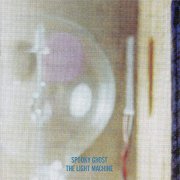 |
The Light Machine (2002, 52.23) **½/T |
|
| All I am Not Start Again Sign Treasure A New Promise Circle is a Woman Shiny Little Star The Palace |
My My Pile of Timber |
|
Current availability:
Chamberlin used:
Until now, Irish guitarist Gerry "Spooky Ghost" Leonard has flown under my radar, but it seems he played on three Bowie albums in the early 2000s, alongside soundtrack work, sessions and collaborations. Unfortunately, his second album under his nom-de-plume, 2002's The Light Machine, largely leaves me cold, his indie-ish vocal melodies and wispy voice serving only to distract from his innovative, John Fahey-style open-tuned guitar work. To my ears, this is easily at its best on six-minute instrumental The Palace, concentrating his strengths (guitar work, chord voices) and excising his weaknesses (his voice and vocal lines).
Producer Paul Bryan plays his own Chamberlin M1, with orchestralish strings and cellos on opener All I Am Not and A New Promise; shame it wasn't used a little more, but there you go. I'd struggle to recommend this overall, but The Palace is worth hearing, although the album's tape-replay work is fairly muted.
See: Paul Bryan
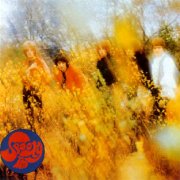 |
It's All About (1968, 37.48) ***½/T |
|
| Society's Child Love Really Changed Me Here I Lived So Well Too Much of Nothing Sunshine Help Me It's All About a Roundabout Tobacco Road It Hurts You So |
Forget it, I Got it Bubbles |
|
Current availability:
Mellotron used:
Spooky Tooth are one of the many psych-ish outfits who sprang up in the UK in the late '60s, although they achieved somewhat more longevity than many, although as far as I can work out, keyboardist/singer Mike Harrison was the only member to last the course. In many ways, It's All About is very much of its time, with the whimsical Love Really Changed Me sounding like it fell out of the previous year, complete with strange 'bubbling water' effects; think 'a rockier Traffic' and you won't go too far wrong.
Uncredited Mellotron on one track only, with some nice strings work on It Hurts You So, presumably from Harrison, though it could be the band's token American, Gary Wright, who went on to a reasonably successful solo career in the '70s. The band went on to release several more albums including a collaboration with Pierre Henry, split up and reform at least once and write a song that would get Judas Priest into very hot water in a US court in the '80s. Backwards masking; yeah, right. Anyway, not bad album, one good Mellotron track.
See: Art
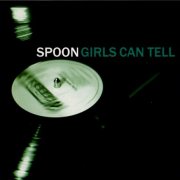 |
Girls Can Tell (2001, 36.03) **½/T |
|
| Everything Hits at Once Believing is Art Me and the Bean Lines in the Suit The Fitted Shirt Anything You Want Take a Walk 1020 AM |
Take the Fifth This Book is a Movie Chicago at Night |
|
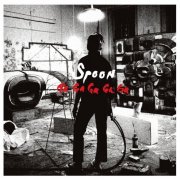 |
Ga Ga Ga Ga Ga (2007, 36.26) **½/T½ |
|
| Don't Make Me a Target The Ghost of You Lingers You Got Yr. Cherry Bomb Don't You Evah Rhthm & Soul Eddie's Ragga The Underdog My Little Japanese Cigarette Case |
Finer Feelings Black Like Me |
|
Current availability:
Mellotrons/Chamberlin used:
Spoon apparently named themselves after the Can song, although they're hardly what you'd call an influence; Spoon play a really average kind of indie, Texan style, of the variety that makes me wonder just what, exactly, people see in them? I suppose 'indie' as a genre relies too heavily on the 'pop' end of things for me, while missing out on joyous melodies, excitement and all the other things that make great pop. Or maybe I'm just getting old. Actually, I dreamed about telling people I was getting old last night; what the hell does that say? I'm getting old, I suppose.
Spoon's third album, Girls Can Tell, is, to my ears, indie-by-numbers, sounding like a muted version of several better things with all the life taken out. Why? Why can't they inject a bit more (any?) passion? Maybe they think they have. Maybe they actually have and it's my skewed perception that's at fault. Anyway, the album bores me greatly, but at least has the good grace to be short by modern standards. The Mellotron's played by band leader Britt Daniel and Conrad Keely, with a suspect flute melody and string chords on opener Everything Hits At Once and some admittedly very nice flutes on the grammatically nonsensically-titled 1020 AM (is that grammatically nonsensical, too?).
2007 brought Ga Ga Ga Ga Ga to Spoon fans. A good way of assessing this album is to look at the track lengths, funnily enough; six of the ten are within seventeen seconds of each other and only one of the other four is more than twenty seconds outside this range. Formulaic is the word we're looking for, I think. To be honest, after playing three Spoon albums back-to-back, I'll be more than happy if I never have to hear them again. Dull, dull indie by-numbers. The ubiquitous Jon Brion plays Chamberlin on the album, with a bonkers flute part on the oddly-titled Rhthm & Soul, with a mere few seconds of the same at the end of My Little Japanese Cigarette Case and dotted throughout closer Black Like Me, although I think the strings are real.
See: Samples etc.
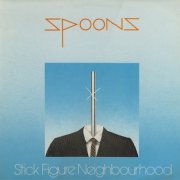 |
Stick Figure Neighbourhood (1981, 41.30) **½/T |
|
| Conventional Beliefs Stick Figure Neighbourhood Red Light For Tran Capitol Hill Ice Age Dropped Dishes Friends in the Media |
Only for Athletes Annita |
|
Current availability:
Mellotron used:
Spoons were an early Canadian new wave band, breaking through with a run of singles from their second album, 1982's Arias & Symphonies. Their debut, the previous year's Stick Figure Neighbourhood (yes! Non-US spelling!), engineered by a young Daniel Lanois, shows that the band were every bit as competent as their better-known contemporaries, making it unsurprising that they went on to greater things. Better tracks include opener Conventional Beliefs, Red Light (the band's Moog Taurus at the beginning, not Lanois') and the synth-heavy Ice Age, although there's a little too much filler for comfort, losing the album a good half star.
Producer Graeme Pole worked with Hugh Syme (Rush) on Ian Thomas' Glider the previous year (thanks, Graeme) and called him when he needed a Mellotron for the recording, Syme playing his own M400 on two tracks, with distant strings on For Tran (ho ho) and more upfront ones, plus choirs on Only For Athletes. So; an interesting album that might have done better had it been British or American, although its Mellotronic input is too low to make it worth tracking down for that alone.
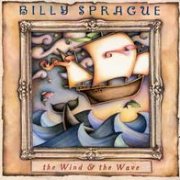 |
The Wind & the Wave (1993, 41.21) **/½ |
|
| Press on Whatever Happened to Love A Way Back Mona Lisa Said The Blessing (of the Fleet) The Sacred Journey When Nothing's Sacred I Saw a Blind Man |
Kumquat May Mona Lisa's Encore |
|
Current availability:
Mellotron used:
Billy Sprague is a fairly typical CCM artist, although he relents on 1993's The Wind & the Wave, with some tracks not being immediately identifiable as Christian. Musically, it's all pretty anodyne stuff, as you might expect, the worst moment being on Kumquat May, which opens with a little girl talking to her dad. She's saying what she'd like to do and when he says, "And where would you go?", her reply is, "To see God". BLEURGH! Did I hear someone say 'brainwashing'? And to think I've been berated for slagging god-botherers...
John Mark Painter plays Mellotron on I Saw A Blind Man, with string chords opening the track, then reprising occasionally throughout the track. Despite its irritating jaunty feel, it's about the best of a bad bunch here, but far, far from essential.
See: Kennedy, Kirkpatrick, Madeira & Sprague
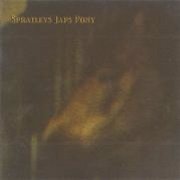 |
Pony (1999, 50.06) ****/TT½ |
|
| Burnt Vessel Fanny Pony Sparrows Vine Oh Fear |
Cabinet Pond Don't You Ail, Flash the Sea to Steam |
|
Current availability:
Mellotron used:
Well, Spratleys Japs are the nearest I've yet come to finding my way onto my own reviews pages (until Litmus, of course) and it's not that close... The story: summer 1998 and Tim Smith from the rather wonderful Cardiacs asks me if he can borrow my Mellotron. It had just been on loan to ex-Cardiacs keyboardist Bill Drake and had started showing signs of incipient breakdown, but I drove it down to Tim's studio anyway. Within days it started playing up very badly indeed, eventually needing a complete motor board upgrade, but Tim loved the inherent wobbliness of the sound and while playing around with it became inspired to write an album's worth of new material. The end result was Pony, featuring Tim's girlfriend Joanne Spratley and various other luminaries of Tim's acquaintance.
Like everything he's involved with, Pony has that unmistakeable 'Tim sound', with those strange Cardiacs scales, melodies and chord sequences. This is probably nearer to earlier offshoot The Sea Nymphs than Cardiacs themselves, with less of the mother outfit's manic energy and more female vocal, although it's instantly recognisable as being from the same 'family'. Aside from my ailing Mellotron, there's lots of piano and fucked-up synth/sampler work to be heard, with less guitar than Cardiacs usually employ. Most of the Mellotron work is high strings in the background, until you get five minutes into Vine, when the whole band takes off and the Mellotron's pushed to the front of the mix, duetting with what sounds like slide guitar, but could be almost anything. All four Mellotron tracks are good, though one of the album's highlights is the eleven-minute Cabinet, which would definitely have benefitted from some strings. Maybe it had broken down completely by that time...
They concurrently released an EP, Hazel, the title track of which, quite bizarrely, is none other than Fear from the album, re-titled. No, I don't know why, either. Anyway, both the album and the EP are available from All My Eye and Betty Martin Music and are fairly essential for Cardiacs fans unaware of their existence. There's enough wobbly Mellotron to keep aficionados happy, too. Buy.
See: Cardiacs
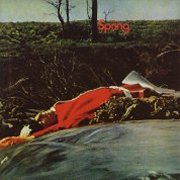 |
Spring (1971, 39.28/96.20) ****/TTTTT |
||
| The Prisoner (Eight By Ten) Grail Boats Shipwrecked Soldier Golden Fleece Inside Out Song to Absent Friends (the Island) Gazing |
[Esoteric two-disc ed. adds: Devil's Bandits (Jack & Jim) Hendre Mews (first version) A World Full of Whispers Painted Ship High Horses Fernleigh Avenue Blackbird (Helping the Helpless) |
Beautiful Losers Flying is an Easy Speed (Get My Share) Fool's Gold Hendre Mews (extended version) A World Full of Whispers (alt. version)] |
|
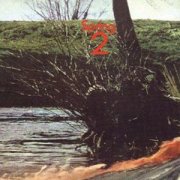 |
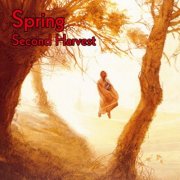 |
Spring 2 [a.k.a. Second Harvest] (2007, recorded 1972, 57.30) ***/TTT |
|
| Jack & Jim Hendre Mews Painted Ship High Horse Fernley Avenue Helping the Helpless A World Full of Whispers Losers |
Get My Share Hendre Mews (diff. mix) A Word Full of Whispers (diff. version) Fool's Gold (bonus) |
||
Current availability:
Mellotrons used:
Ah - proto-prog territory again. Spring's sole LP has assumed significance beyond its actual content as a 'Mellotron album' amongst fans of early progressive rock; it certainly is stuffed with MkII; not just most tracks, but most of most tracks. Three band members are credited with playing it; vocalist Pat Moran, guitarist Ray Martinez (both of whom went on to better-known things) and keyboard man Kips Brown, although with a single machine (even a regular dual-manual one), they can surely only have played it one at a time. This also doesn't account for how they might've played this material live; most of the way through opener The Prisoner, for example, the Mellotron strings are overdubbed with either flute or very clicky brass. Unless, of course, they'd had the left-hand tapes replaced with another set of right-hand ones, à la the Moody Blues; producer Gus Dudgeon's sleevenotes state "Everything on the album is exactly as it is on stage - with the exception of some over-dubbed acoustic guitar". Curiouser and curiouser...
Spring certainly gets some Mellotron in; apart from the two tracks where they managed to resist the temptation, the band slather it all over everything, mostly to good effect, it has to be said. The music is probably less interesting than I'd been led to believe, sadly; typical early progressive, just with Mellotron instead of organ, or indeed, anything much else, although Brown also sticks in the odd bit of organ and piano. So, to be brutally honest, a rather ordinary proto-prog album, but packed to the gills with The Beast, justifying its 'Mellotron classic' tag. The original triple fold-out sleeve is gorgeous, but you're unlikely to find one, so I'd settle for the CD, although the bonus tracks on 1992's original CD issue, on The Laser's Edge, are a bit unexciting.
Trying to untangle the Gordian knot of confusion surrounding Spring 2 (a.k.a. Second Harvest) is a job worthy of Hercules, to stretch the Ancient Greek connection from their debut's Golden Fleece to breaking point. OK, it's not quite that obfuscated, but a collection of what sound like demo recordings leaked out on Far-Eastern CD a while back, although their status seemed to be nearer 'bootleg' than 'official'. The Second Harvest label finally released them officially as, er, Second Harvest in 2007, giving the rest of us a chance to hear what all the fuss is about. Er, very little, if truth be told; better contributions include High Horses and the 'bonus' versions of Hendre Mews and Fool's Gold, but the majority of the material is rather limp mainstream early '70s rock, with little real progressive input. Although their MkII crops up on several tracks, the use is well down from Spring, with naught but murky strings on Hendre Mews, a clicky trombone solo and strings on High Horses, strings on A World Full Of Whispers, vibes on Losers and another trombone solo on Get My Share, although I suppose that's still an awful lot more Mellotron than you'll hear on most albums on this site.
In 2015, our good friends at Esoteric Records finally did the decent thing and reissued Spring with the entirety of Spring 2 as a bonus disc, making this the only release you need. It seems that track titles have been corrected in several cases, while the running order of the second disc has been changed slightly. For what it's worth, the three bonus tracks on that 1992 CD are all present and correct, too.
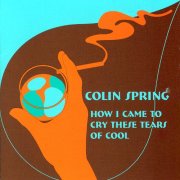 |
How I Came to Cry These Tears of Cool (2005, 59.09) ***/T |
|
| Joe McCarthy is Sweeping Off His Grave Does She Still? Lover, There's a Light on Give My Regrets to Broadway November Let's Burn the Guitars Chinatown Life Out on the Fringe |
Culiacan Rosa, Rosa From Barcelona Sistine Chapel Ceiling Fresh Kill in Nowhereville Artis the Spoonman (mix) |
|
Current availability:
Mellotron used:
Colin Spring's fourth album, 2005's How I Came to Cry These Tears of Cool, sits at the folk end of Americana, guests including members of The Young Fresh Fellows, Screaming Trees and The Walkabouts, amongst others. Largely acoustic, highlights include opener Joe McCarthy Is Sweeping Off His Grave, Fresh Kill In Nowhereville and electric closer Artis The Spoonman, although Spring could probably have lost a handful of lesser tracks, bringing the album down to a more manageable length.
Producer Johnny Sangster (Mudhoney, The Posies) plays a high, real-sounding Mellotron string part on Give My Regrets To Broadway; as so often, it's a shame it's only used on one song. I can't actually find any evidence that Spring recorded again; a pity, as talent's pretty thinly spread out there.
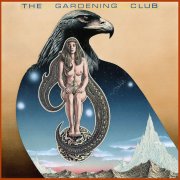 |
The Gardening Club (1983, 50.46) ***½/½ |
|
| Midnight Road Mole Hole Blues The Traveller Andromeda The Garden Three Days at Brighton Rebirth The Stone That Speaks |
Endersby's Ride in Three Parts Endersby Meets the Team Aerial Adventures Endersby Meets the Chef Nirvana Isn't |
|
Current availability:
Mellotron used:
Although UK-born, artist Martin Springett has spent more of his life in Toronto, playing in bands on and off since the '70s. 1983's The Gardening Club (the gorgeous artwork's his, too) is a quite unique, song-based progressive rock album featuring hints of pastoral Genesis, Happy the Man and various Canterbury scene alumni, the end result being at least slightly unlike anything else you've heard. Jazzy in places, folky in others, it might just be at its best on the twelve-minute Endersby's Ride In Three Parts, although a propensity for Canterburyesque chord sequences would be a useful listening aid.
Chris Mckim plays credited Mellotron on The Stone That Speaks, with background flutes, distinct from Russ Walker's real one and a handful of not-that-Mellotronic string chords at the end of the track. Really not a Mellotron Album, then, but those nice Gonzo Multimedia people reissued this in 2017, so if you like the sound of it...
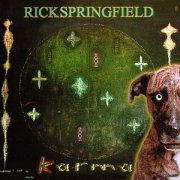 |
Karma (1999, 49.30) **½/½ |
|
| His Last Words It's Always Something Religion of the Heart Beautiful Prize Karma Shock to My System Free Prayer |
White Room In Veronica's Head Ordinary Girl Act of Faith Untitled (Hey Maria) |
|
Current availability:
Mellotron used:
These days, Rick Springfield is apparently considered the 'thinking man's AOR artist', though I'm not sure if that's a particularly enviable area to inhabit. Karma opens with an odd little piece devoted to his father, His Last Words, with various voices speaking about parental death over a muted backing, but after that, it's straight into what Mr.Springfield does best, i.e. extremely mainstream AOR for people who find Journey and Foreigner too heavy. This kind of music is loved by millions, but not me, I'm afraid. It's all done with impeccable 'taste', but its lame pop/rock glossiness is the sort of thing that makes me want to play Black Sabbath, VERY LOUD. I can't really pick out the tracks I particularly disliked, but I can say that His Last Words makes for an interesting diversion and the untitled hidden track, usually known as Hey Maria, is slightly more interesting than the rest of the album and also gets in a subtle reference to female masturbation.
As for the Mellotron, played by either Richard Shindell or Springfield himself (I'm not sure which), well, I can only hear it on one track, Prayer, with a brief flute part. As far as I can tell, all the rest of the strings are generic samples, although there may be more Mellotron hidden in the mix here and there. So; if you like AOR, you'll like Karma and if you don't, you won't. That's it. Oh and don't bother for the Mellotron, but I expect you'd already worked that out for yourself.
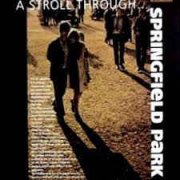 |
A Stroll Through... Springfield Park (2005, recorded 1967-68, 15.05) ***/TT½We Show You ParadiseBattle-Cry Loud as You Can Love's Our Thing Halfway There Land of Hope and Gloria |
Current availability:
Mellotron used:
Springfield Park? An obscure British psych/pop outfit who only ever released the one 7", '68's rather ordinary Never An Everyday Thing b/w I Can See The Sunshine, although the band heave been subject to reappraisal after the discovery of another six tracks, released on a 10" EP in 2005, A Stroll Through... Springfield Park. It starts well, with the moody (Moody?) We Show You Paradise and Battle-Cry, Love's Our Thing being another highlight, although the upbeat Loud As You Can and closer Land Of Hope And Gloria fail to match the quality of the other material.
Someone (Martin Croxford?) plays Mellotron, with distant strings on opener We Show You Paradise and more upfront ones on Battle-Cry and Love's Our Thing, non-coincidentally the EP's best tracks. Great for vinyl obsessives, but it might be nice if these tracks were made available in one digital format or another.
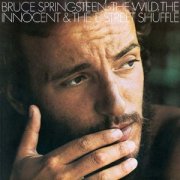 |
The Wild, the Innocent & the E Street Shuffle (1973, 47.02) ***½/TThe E Street Shuffle4th of July, Asbury Park (Sandy) Kitty's Back Wild Billy's Circus Story Incident on 57th Street Rosalita (Come Out Tonight) New York City Serenade |
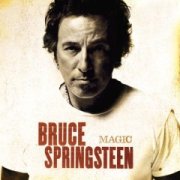 |
Magic (2007, 47.43) ***/T |
|
| Radio Nowhere You'll Be Comin' Down Livin' in the Future Your Own Worst Enemy Gypsy Biker Girls in Their Summer Clothes I'll Work for Your Love Magic |
Last to Die Long Walk Home Devil's Arcade Terry's Song |
|
Current availability:
Mellotron/Chamberlin used:
Broooce's second album (second of 1973, in fact), The Wild, the Innocent & the E Street Shuffle, is less formative than his debut, if still a long way from 'iconic', although opener The E Street Shuffle is funky in a way Bruce would rarely be again and 4th Of July, Asbury Park (Sandy) is a classic (if relatively underplayed) Bruce ballad. All the elements are here, but it would take some lineup changes and Bruce's surrender to Broadway for it to all come together; with the benefit of hindsight, it's easy to see why '75's Born to Run was his breakthrough. Still, the description of his music I found somewhere, "A soul revue playing West Side Story" still applies. Best tracks? Side two beats side one hands-down, Incident On 57th Street, Rosalita (Come Out Tonight) and closer New York City Serenade crushing all opposition.
Mellotron? There's nothing credited on the original sleeve (keys man David Sancious is credited with 'string arrangement'), but Wikipedia credits him with Mellotron (apparently rented from Carroll Music in Manhattan) on the nine-minute New York City Serenade and, indeed, there it is, with orchestrally-arranged strings that almost fool the ear in places. Sancious would go on to play on Born to Run's iconic title track and record a clutch of superb albums of progressive fusion (for want of a better term) over the next few years, before slipping into session work. Apologies, incidentally, to Aaron, who told me about this several years ago, as I initially rejected it for inclusion.
After using the E Street Band for the first time in nearly twenty years on 2002's The Rising, Bruce summoned them again for 2007's Magic. Yup, it's a Bruce album... For us, the non-faithful, they all sound pretty much the same, I have to say, to the point where attempting to isolate 'best tracks' is fairly futile, but I'm sure his hardcore fans love it. Patrick Warren is credited with 'tack piano and Chamberlin' on several tracks, but I suspect that's 'either/or', as against 'both'. In fact, all I can hear is faint background strings on Long Walk Home and a more upfront part on Devil's Arcade, although the cello on the latter is real.
See: Samples etc. | Patti Scialfa